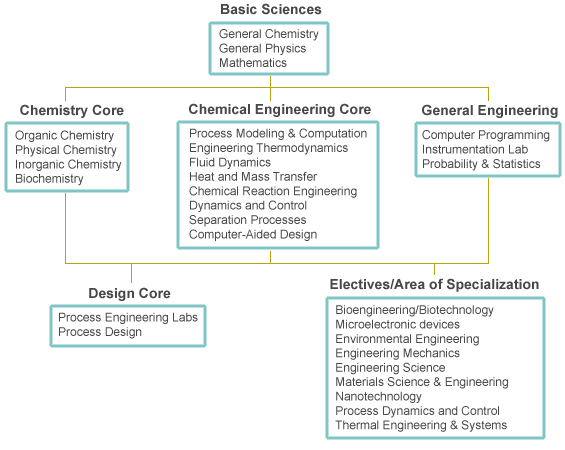To receive a B.S. in chemical engineering, students must complete 139 units of coursework required for the major, plus all college general education requirements. (Example: Warren students must take 48 units of general education coursework in addition to the 139 units of major requirements for a total of 187 units for graduation)
Every CENG course (except CENG 4 and CENG 199) must be taken for a letter grade. All courses must have a grade of C- or above as a passing grade. This includes all Math, Physics, and Chemistry courses that are part of the major requirements and all technical electives. A one-unit introductory seminar (CENG 4) is required of all incoming freshmen and transfer students.
The organization is shown in the chart below. Course descriptions can be found here.

Course descriptions for core classes can be found here.
General education requirements (varied units):
This requirement is intended to fulfill the general education requirements (G.E.) from respective colleges.
The example above includes 48 units of G.E. requirements as required for Warren College students. Students in other colleges need to adjust the plan to match their own college requirements.
Basic sciences (fifty-four units):
This lower-division requirement includes twenty-four units of mathematics (MATH 18 (formerly MATH 20F) and 20A-E), fourteen units of physics (PHYS 2A-C, 2CL), and sixteen units of chemistry (CHEM 6A-C, 7L). All basic science courses required for the major must be taken for a letter grade.
Chemistry Core (twelve units):
Three advanced chemistry electives must be selected from among the pre-approved list: CHEM 41A, 41B, 41C, 43A, 114A (or BIBC 100), 114B (or BIBC 102), 120A, 120B, 130, 131, or 132. (Note: Students may not receive credit for both BIBC 100 and CHEM 114A, or BIBC 102 and CHEM 114B).
Effective for Fall 2022, the CHEM 40 series was being phased out, and effective FA23, the focus has changed, and will no longer satisfy Engineering needs. There is a new CHEM 41 series being offered beginning Fall 2022. The CHEM 41 series is a modified and improved version to better accommodate the needs of chemistry, biochemistry and engineering students.
- If you haven't started either advanced chemistry series (CHEM 40A-C or CHEM 41A-C), then take the new improved CHEM 41 series.
- If you have started the CHEM 40 series (CHEM 40A-B), then continue with the current 40 courses through CHEM 40C. If you are unsure if you are allowed to continue in the CHEM 40 series, check your degree audit. CHEM 40 A-C must be listed as an approved course on your degree audit to be used towards your advanced chemistry degree.
Simply stated, the focus of CHEM 40 is being changed and will not align with Engineering needs. If you have already completed 40A or 40B, then finish up with the Chem 40 series. If you are starting out - take CHEM 41A-C. CHEM 41 courses will now fulfill the advanced chemistry requirement. All Chemistry core courses must be taken for a letter grade.
Chemical engineering core (thirty-three units):
This requirement covers chemical process modeling, solution thermodynamics, transport phenomena, chemical reaction engineering, process control, and unit operations (CENG 100, 101A–C, 102, 113, 120, 122). Also includes a one-unit introductory seminar (CENG 4) which is required of all incoming freshmen and transfer students.
Process laboratory and design (sixteen units):
This requirement is crucial to fulfilling the Chemical Engineering Program (B.S.) goals by providing hands-on and experiential instruction in the areas of project design, unit operations, hazards analysis, ethics, and economic analysis.
General engineering (twelve units):
This requirement covers basics in computer programming, probability and statistics, and instrumentation. The computer programming requirement can be satisfied with a course in Matlab (CENG 15). Probability and statistics can be satisfied with CENG 114. Instrumentation is satisfied with CENG 170*.
*CENG 170 has replaced MAE 170 for the Chemical Engineering major requirements. Students will not be given credit for both MAE 170 and CENG 170.
Technical Electives (twelve units):
Electives are intended to broaden and enhance professional goals. They may be chosen to achieve either breadth or depth in one’s education. All electives must be upper-division courses in engineering. Pre-approved courses are listed here. If students wish to follow an area of specialization, they must take all 3 electives from the same category. An area of specialization will not be noted on students' degree audits. With the exception of CENG 199, all technical elective courses must be taken for a letter grade.
